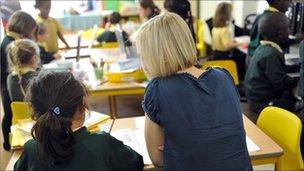Number of school academies triples to more than 600
- Published

The Education Secretary says ideally all new schools should be academies
The number of academy schools in England has tripled since the coalition came to power less than a year ago.
Another 162 schools in England became academies this month, bringing the total to more than 600, compared with 203 at the time of the last election.
And the government is inviting more to apply for the semi-independent status, existing outside local authorities, in charge of budgets, pay and conditions.
Unions oppose them, saying they will fracture the education system.
The government says one in six of England's secondary schools is now an academy.
Ultimately, it wants all schools to have this status, meaning they would be directly funded from central government.
Schools that "convert" to become academies are given money which would previously have been used by the local authority to provide services to schools such as those for children with special educational needs (SEN).
There are now 629 academies open. Some of these (272) are old-style academies which were being set up by Labour as a way of raising standards in disadvantaged areas and were already in the pipeline at the time of the last election in May 2010.
Minister for Schools, Lord Hill, said: "I am delighted that so many schools have decided to become academies. As academies they can decide what is best for their pupils, parents and the local community, free from red-tape and politicians.
"By setting good schools free and improving performance in weak schools we will raise standards for all children no matter their background."
Regional variations
The government says in six local authorities, a majority of secondary schools are now academies. These are: Bromley, North East Lincolnshire, Plymouth, Reading, Rutland and Southwark.
In the case of the London borough of Southwark, nearly 70% of its secondary schools are academies - but most of these were created under the old blueprint.
It has 11 academies but only two are the new style being promoted by the coalition.
However, in Bromley, also in London, all 11 of its academies have converted in the past year. There, 65% of state secondaries are academies.
In Plymouth, all but two of its 10 academies are schools which opted for the status following the election.
Primary schools can also become academies - but relatively fewer have taken up the offer so far. Since March, 82 primary schools have become academies.
Special schools can also apply for the status and officials say so far four have been approved and are "in the pipeline".
Ministers initially prioritised schools classed as outstanding or good for conversion to academy-status but they are now opening the door to other schools.
This means those judged to be "satisfactory" will be considered. Officials say schools will need to show they have good leaders and be improving and "performing well".
Local accountability
Teachers' unions oppose the conversion of schools to academies and there have been strikes at some schools planning to make the change.
They say the academies programme will lead to a splintering of the education system, more competition between schools and less local accountability.
Christine Blower, general secretary of the National Union of Teachers, said: "It is irresponsible for the government to be prioritising an expensive academy programme at a time when essential local authority services to schools - such as specialist SEN support, speech and language therapy, education psychologists - are being cut.
"Head teachers and governors should think very carefully before relinquishing the support available from the local authority and its family of schools at a time of such economic hardship and uncertainty."
The government says the programme will improve standards in schools by allowing head teachers to take more control and do what is right for their pupils.
- Published6 January 2011
- Published28 January 2011
- Published28 January 2011
- Published27 January 2011
- Published27 January 2011
- Published24 November 2010